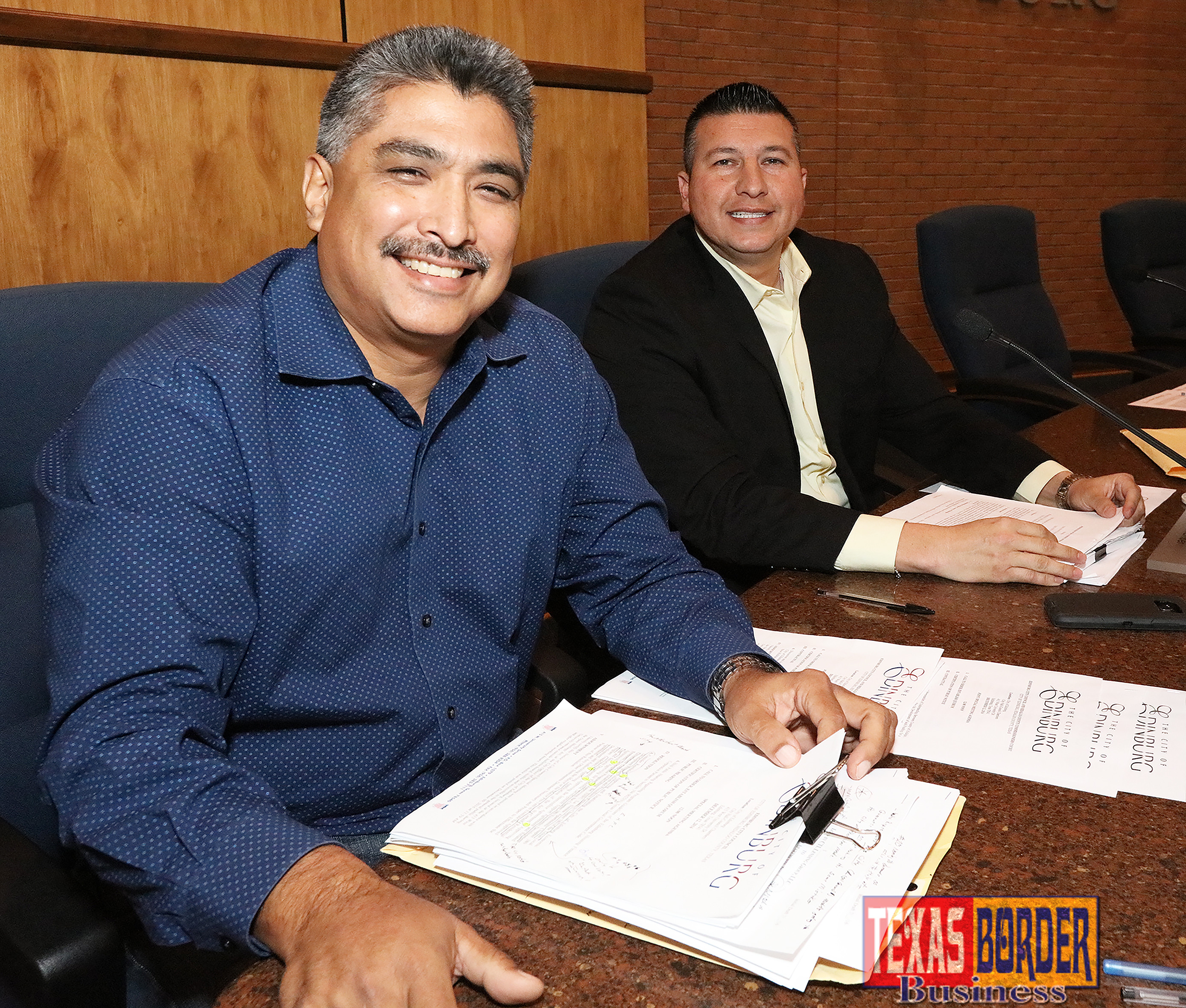
Texas Border Business
By DAVID A. DÍAZ
Edinburg led major Valley economies with 4.57 percent growth rate from January through October 2016, compared with the same period last year, while statewide, all cities combined showed only a one percent increase, according to the Texas Comptroller of Public Accounts.
For the month of October 2016, Edinburg’s retail economy – as measured by local sales taxes generated from purchases of eligible goods and services – had the third-best showing among the Valley’s largest cities, coming in with a 4.86 percent improvement over the month of October 2015.
Those figures are based on sales made in October 2016 by businesses that report tax monthly.
The local sales tax data is among the latest economic barometers featured in a detailed summary provided by the state comptroller’s office, which released retail sales figures on Wednesday, December 7, 2016.
Among its many duties, the Texas Comptroller’s office is the state’s chief tax collector, accountant, revenue estimator and treasurer.
The local sales tax is used in Edinburg to help pay for many city services, while the Edinburg EDC uses its one-half cent local sales tax to help generate economic development in the city.
The amount of local sales taxes collected also helps reflect the strength of an economy, along with construction activities, per capita income, education, historical performances, and related trends.
The Edinburg EDC, of which Agustín García, Jr. is Executive Director, is the jobs-creation arm of the Edinburg Mayor and Edinburg City Council.
The Edinburg EDC Board of Directors is comprised of Mayor Richard García as President, Harvey Rodríguez, Jr. as Vice President, Elías Longoria, Jr. as Secretary/Treasurer, and Richard Rupert, and Dr. Peter Dabrowski as Members.
Texas Comptroller Glenn Hegar announced on Wednesday, December 7, 2016 that cities, counties, transit systems and special purpose taxing districts combined generated $627.6 million in local sales taxes allocations in October 2016, which represents 0.2 percent more than in October 2015.
“The cities of Dallas, Fort Worth, Austin, El Paso and San Antonio continue to see significant increases in sales tax allocations,” Hegar said. “The cities of Houston, Sugar Land and Plano saw noticeable decreases in sales tax allocations.”
Weslaco had the best showing for all major Valley cities for the month of October 2016, registering a 9.04 percent improvement over October 2015, followed by Pharr (5.58 percent) and Edinburg (4.86 percent).
Based on local sales taxes generated, McAllen had the best showing in terms of revenue for October 2016 ($4,254,734.05), followed by Brownsville ($2,718,614.17), Harlingen ($1,702,513.47), and Edinburg ($1,644,571.30).
During the first 10 months of 2016, Edinburg’s retail economy produced $21,171,250.82 in local sales taxes, compared with $20,245,270.46 for January through October 2015, representing an improvement of 4.57 percent.
For October 2016, Edinburg’s retail economy generated $1,644,571.30 in local sales taxes, compared with $1,568,278.46 during the same period in 2015, representing the improvement of 4.86 percent, also according to the Texas Comptroller of Public Accounts.
The sales tax, formally known as the State Sales and Use Tax, is imposed on all retail sales, leases and rentals of most goods, as well as taxable services. Texas cities, counties, transit authorities and special purpose districts have the option of imposing an additional local sales tax for a combined total of state and local taxes of 8 1/4% (.0825).
HOW OTHER VALLEY CITIES, COUNTIES PERFORMED FOR OCTOBER 2016 AND JANUARY THROUGH OCTOBER 2016
Based on the amount of sales taxes generated, according to the state comptroller’s office, the Valley’s major cities ranked accordingly in the following local sales tax figures for October 2016 and January through October 2016:
October 2016 compared with October 2015
McAllen: $4,254,734.05, down 4.37 percent compared with October 2015 ($4,449,457.94);
Brownsville: $2,718,614.17, down 2.56 percent compared with October 2015 ($2,790,094.50);
Harlingen: $1,702,513.47, up 0.03 percent compared with October 2015 ($1,701,844.28);
Edinburg: $1,644,571.30, up 4.86 percent compared with October 2015 ($1,568,278.46);
Pharr: $1,379,834.21, up 5.58 percent compared with October 2015 ($1,306,892.47);
Mission: $1,175,858.75, up 2.05 percent compared with October 2015 ($1,152,186.89); and
Weslaco: $881,823.37, up 9.04 percent compared with October 2015 ($808,705.70).
January through October 2016
McAllen: $60,112,579.67, down 3.95 percent compared with January through October 2015
($62,586,118.52);
Brownsville: $36,934,743.53, up 1.85 percent compared with January through October 2015 ($36,263,611.67);
Harlingen: $22,558,061.64, up 2.23 percent compared with January through October 2015 ($22,064,521.92);
Edinburg: $21,171,250.82, up 4.57 percent compared with January through October 2015 ($20,245,270.46);
Pharr: $16,853,720.68, up 3.00 percent compared with January through October 2015 ($16,361,965.77);
Mission: $15,128,819.81, down 0.03 percent compared with January through October 2015 ($15,134,622.14); and
Weslaco: $11,679,765.20, down 0.18 percent compared with January through October 2015 ($11,701,640.39).
All cities in Hidalgo County reported a total of $11,265,937.08 in local sales taxes during October 2016, compared with $11,198,064.26 in October 2015, an increase of 0.61 percent. Year-to-date (January through October 2016), all cities in Hidalgo County registered $151,223,646.05 in local sales taxes, compared with $151,708,691.57 for the same 10 months in 2015, a decrease of 0.32 percent.
Hidalgo County government does not collect a local sales tax.
All cities in Cameron County generated $5,318,852,02 in local sales taxes during October 2016, compared with $5,390,140.54 in October 2015, a decrease of 1.32 percent. Year-to-date (January through October 2016), all cities in Cameron County registered $72,636,315.89 in local sales taxes, compared with $70,924,045.88 for the same period in 2015, an increase of 2.41 percent.
Cameron County government does not collect a local sales tax.
All cities in Starr County produced $383,458.45 in local sales taxes during October 2016, compared with $398,577.98 in October 2015, a decrease of 3.79 percent. Year-to-date (January through October 2016), all cities in Starr County registered $5,315,480.56 in local sales taxes, compared with $5,384,193.94 for the same period in 2015, a decrease of 1.28 percent.
Starr County government does not collect a local sales tax.
All cities in Willacy County produced $101,893.59 in local sales taxes during October 2016, compared with $119,163.26 during the same month in 2015, a decrease of 14.49 percent. Year-to-date (January through October 2016), all cities in Willacy County registered $1,481,304.72 in local sales taxes, compared with $1,547,738.26 for the same period in 2015, a decrease of 4.29 percent.
Willacy County government does not collect a local sales tax.
For details of the October 2016 local sales tax figures for all cities, counties, transit systems, and special purpose taxing districts, locate the Monthly Sales Tax Allocation Comparison Summary Reports at the comptroller’s website:
https://www.comptroller.texas.gov/transparency/local/allocations/sales-tax/














